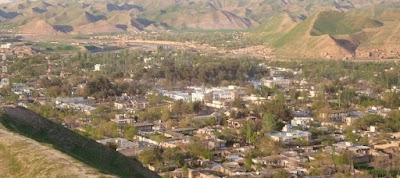Qarqin (قرقین)
Overview
Qarqin, nestled in the Jowzjan province of Afghanistan, is a charming town steeped in rich cultural and historical significance. This quaint community has evolved from early settlements into a vibrant hub, shaped by its unique geographical location and diverse heritage. Positioned near the Amu Darya River—one of Central Asia's major waterways—Qarqin has historically played a crucial role in trade, agriculture, and sustaining its local population.
Historical Foundations
The roots of Qarqin can be traced back centuries, with its fertile land along the riverbank offering an ideal environment for early settlers primarily engaged in farming. Its proximity to key trade routes transformed Qarqin into an essential stop for merchants and travelers, facilitating the exchange of goods, ideas, and cultural practices that have molded the town's identity over time.
Agricultural Ingenuity
One remarkable feature of Qarqin is its sophisticated irrigation system, which has enabled the community to thrive despite the arid climate of northern Afghanistan. The ingenuity of its early inhabitants is showcased in the construction of an extensive network of canals and water channels derived from the Amu Darya River. These vital channels ensure a steady water supply for fields and orchards, nurturing a vibrant agricultural community known for cultivating crops such as wheat, barley, and melons.
Cultural Melting Pot
Qarqin has experienced various cultural influences due to invasions and the arrival of diverse ethnic groups. It has evolved into a melting pot where local Pashtun, Uzbek, and Turkmen cultures blend harmoniously, creating a unique and cohesive society. Traditional Afghan architectural styles are evident in the town's structures, with mud-brick homes adorned with intricate patterns and designs that reflect the area's rich craftsmanship.
Social and Cultural Life
The town's communal spaces, including the central marketplace and local mosque, are pivotal to the social and cultural fabric of Qarqin. The bustling bazaar, filled with a variety of stalls and shops, serves as a vibrant hub where locals engage in commerce, share news, and connect with each other. Meanwhile, the mosque stands as a testament to the town's spiritual heritage, providing a sanctuary for worship and community gatherings.
Resilience in Adversity
In recent years, Qarqin has faced significant challenges due to political instability and economic difficulties. Despite these hurdles, the resilience of its residents shines through as they continue to rebuild and adapt. Local initiatives focused on enhancing infrastructure, healthcare, and education are gaining momentum, supported by both national and international organizations dedicated to improving the quality of life in the town.
Cultural Heritage
Despite modern advancements, Qarqin retains its historical charm. The town's folklore, traditional festivals, and music are celebrated with enthusiasm, preserving its cultural essence. The hospitality of its residents is notable, reflecting a long-standing tradition of welcoming guests and sharing their rich cultural heritage with others.
In summary, Qarqin in Jowzjan, Afghanistan, encapsulates the spirit of endurance and cultural diversity. From its ancient irrigation systems to its bustling bazaars, the town is a remarkable blend of history and modern resilience. Its journey through time serves as a testament to the adaptability and strength of its people, illuminating the beauty of Afghan culture and heritage.







